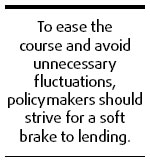| Comment | ||
| Avoid a sharp brake | ||
|
To dwarf the Chinese government's 4-trillion-yuan (US$586 billion) stimulus package, Chinese banks have extended new loans of 4.58 trillion yuan (US$671 billion) in the first quarter. Such a credit boom makes it almost certain that China is going to see the biggest credit expansion in history this year. The central government has once set a target of at least 5 trillion yuan of new loans to back its pursuit of 8 percent growth of the national economy. This weekend at a forum, a vice-chairman of the China Banking Regulatory Commission is talking about new loans that are expected to top at least 8 trillion yuan this year, according to a Sina.com report. Given the rapid surge of new loans in the first three months, an 8-trillion-yuan projection cannot be said to be an exaggeration. Actually, this suggests that the pace of credit expansion in the next three quarters will be cut down to about one third of that in the first quarter.
As an important and leading indicator, robust credit growth has tremendously boosted confidence in an early recovery of the Chinese economy amid a global recession. With more and more domestic signs of bottoming out, Chinese policymakers are tiptoeing their way forward to maintain the country's growth momentum as well as sustain market sentiment. That explains why the central bank made it clear that it will not control the scale of credit extended by commercial banks though the rate at which loans are growing may spell trouble. And the banking regulator also played down its latest investigation into the use of bank loans as merely an annual routine for ensuring credit safety and financial stability. The authorities' worry about the market's over-reaction to tightened controls on lending is obvious and understandable. But unavoidable is a slowdown of the credit expansion if the national economy is not to be caught between rising bad loans and vicious inflation. Even if the amount of new loans is to be capped at about 8 trillion yuan this year, both lenders and borrowers will have to brace themselves for a drastic slowdown of credit expansion. To ease the course and avoid unnecessary fluctuations, policymakers should strive for a soft brake to lending. Any delay in reining in credit expansion will either send bank loans through the roof or force an abrupt credit freeze which may thereby unsettle the country's economic recovery.
(China Daily 04/27/2009 page4) |
||
| 【 Most viewed 】 | ||
| 【Jump to 】 | ||
| Nation |Biz|Comment World|Celebrity|Sports Odds|Travel|Health | ||
| m.chinadaily.com.cn | ||
|
